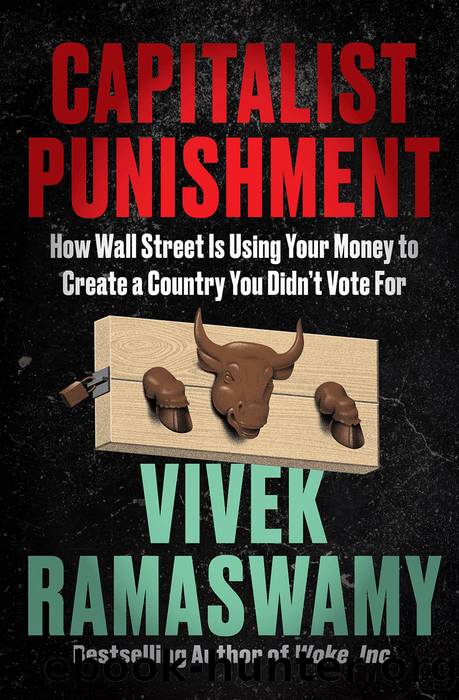Capitalist Punishment by Vivek Ramaswamy

Author:Vivek Ramaswamy [Ramaswamy, Vivek]
Language: eng
Format: epub
Publisher: HarperCollins
The Tyranny of Compelled Association
Thereâs another significantâand often overlookedâconstitutional protection on which ESG elephants are trampling: freedom of association. Unlike freedom of speech, religion, press, and assembly, freedom of association isnât explicitly listed in the text of the First Amendment. But the Supreme Court has said itâs there. The Court first recognized this right in the 1958 case National Association for the Advancement of Colored People v. Alabama, in which it held that members of a civil rights group had the right to associate with one another free from state interference. Alabama wanted the NAACP to produce a list of names and addresses of all of its members; the NAACP refused. The Supreme Court wasnât about to aid and abet Alabamaâs shenanigans, so it recognized a new right, sometimes called the right of expressive association. In his majority opinion, Justice John Marshall Harlan II wrote, âIt is beyond debate that freedom to engage in association for the advancement of beliefs and ideas is an inseparable aspect of the âlibertyââ assured by the Constitution. And so freedom of association was born.
Just as freedom of speech includes freedom from compelled speech and freedom of religion includes freedom from compelled religion, the right of free association includes the right to be free from compelled association. Thatâs why the Supreme Court held, in Boy Scouts of America v. Dale (2000), that the Boy Scouts have a constitutional right to exclude gay men as scoutmasters and, in Hurley v. Irish-American Gay, Lesbian, and Bisexual Group of Boston, Inc. (1995), why a Boston veterans group organizing a Saint Patrickâs Day parade had a constitutional right to exclude an LGBTQ group (and the Ku Klux Klan) from marching in its parade. These groups exist for an expressive purpose, to send a message, and requiring them to accept members who do not align with their views would dilute that expressive purpose. Such groups are allowed to be choosy.
The right to be free from compelled association prevents the government from forcing individuals to join groups. That means that the government cannot force an employee to join a group, such as a pension fund organization, that stands for something with which the individual disagrees. This right is related to the right to be free from compelled subsidization of speech, but itâs distinct. Thatâs because even if the government refunds all of the money going to political causes or even makes membership free, it still canât force individuals to associate with a group that espouses social or political views with which they disagree.
Extreme examples may help to highlight the point. The Biden administration could not, for example, make every government employee enroll as a member of Planned Parenthood as a condition of employment. So, too, the Trump administration could not make every civil servant join the National Rifle Association. Even if the organizations were on board with such a plan, it would infringe on employeesâ rights as American citizens. Itâs true that it would be worse if the government said that
Download
This site does not store any files on its server. We only index and link to content provided by other sites. Please contact the content providers to delete copyright contents if any and email us, we'll remove relevant links or contents immediately.
Talking to Strangers by Malcolm Gladwell(11877)
The Compound Effect by Darren Hardy(7559)
The Lover by Duras Marguerite(7115)
Wonder by R. J. Palacio(7059)
Tools of Titans by Timothy Ferriss(6947)
The Circle by Dave Eggers(6257)
A Court of Wings and Ruin by Sarah J. Maas(6076)
Kaplan MCAT General Chemistry Review by Kaplan(6054)
Deep Work by Cal Newport(5464)
To All the Boys I've Loved Before by Jenny Han(5180)
Wiseguy by Nicholas Pileggi(4586)
1,001 ASVAB Practice Questions For Dummies by Powers Rod(4038)
The Body: A Guide for Occupants by Bill Bryson(3801)
Barron's AP Biology by Goldberg M.S. Deborah T(3632)
Cracking the GRE Premium Edition with 6 Practice Tests, 2015 (Graduate School Test Preparation) by Princeton Review(3596)
ACT Math For Dummies by Zegarelli Mark(3565)
Eat That Frog! by Brian Tracy(3514)
Kaplan MCAT Organic Chemistry Review: Created for MCAT 2015 (Kaplan Test Prep) by Kaplan(3423)
Pre-Suasion: A Revolutionary Way to Influence and Persuade by Robert Cialdini(3414)
